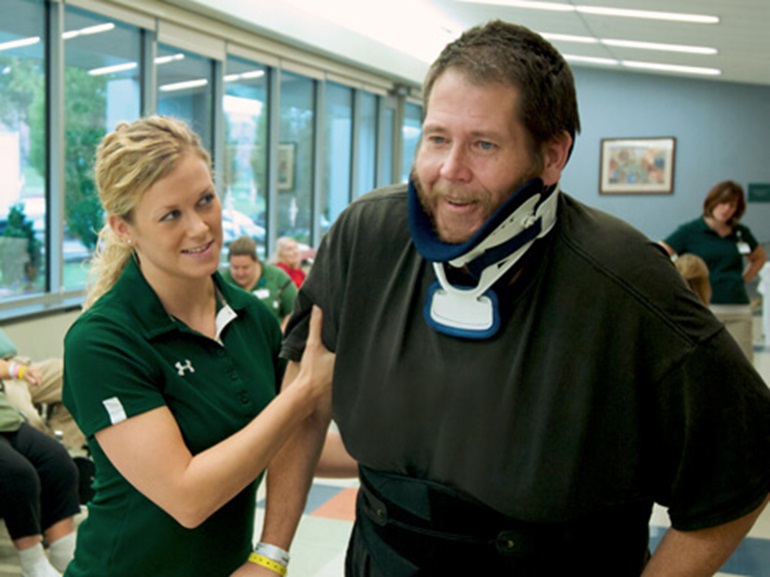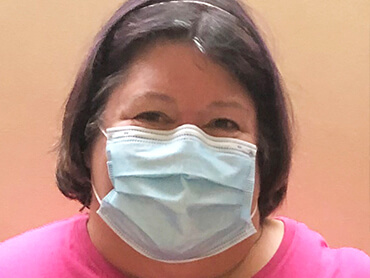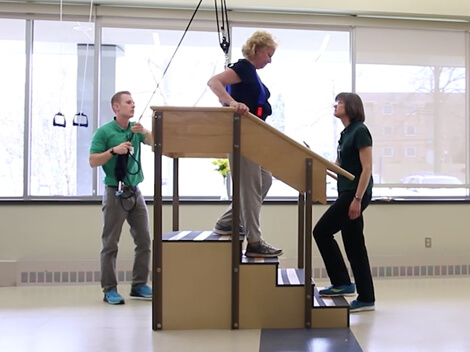Spinal Cord Injury Rehabilitation

Your progress. Our programs.
Helen M. Simpson Rehabilitation Hospital focuses on your individual needs and goals to prepare you for life ahead.
-
We draw on the knowledge of a team of spinal cord injury specialists to address the medical, physical, functional and emotional issues you face.
This interdisciplinary team is led by a physiatrist a physician board-certified in physical medicine and rehabilitation. Your team also includes rehabilitation nurses; physical, occupational and speech therapists; dietitians; case managers; and other clinical and support staff, depending upon your specific needs.
-
Treatment is tailored to your specific needs and goals and carefully integrated to help you:
- Improve physical function and mobility
- Develop strength, skills and strategies to perform daily activities
- Manage breathing and respiratory issues
- Manage spasticity and pain
- Improve bladder and bowel function
- Use adaptive equipment and technologies to increase independence
- Address psychological, emotional, social or other difficulties as you adjust to life ahead
- Return home, and resume work, school or community activities with as much confidence and independence as possible
-
Rehabilitation is an active process that consists of therapy a minimum of three hours a day, five days a week. Your schedule will be divided into physical, occupational, speech and/or other therapy sessions throughout the day based on your needs. The skills and strategies you learn will be reinforced by your nursing team. You and your family will also be given the education and training needed to maintain your overall health and well-being following discharge from our hospital.
While at our hospital, you will benefit from an integrated program that offers hands-on therapy and treatment and extensive education that may include:
- Manual and robotic training to improve circulation and function
- Functional electrical stimulation to enhance muscle activity
- Adaptive equipment to assist with self-care
- Spasticity, respiratory and medication management
- Wheelchair seating and mobility training
Your progress will be carefully monitored and your plan of care will be adjusted as you continue to move toward your goals.
-
It’s important to remember that recovery takes time. Every patient is different and your length of stay will depend on the extent of your injury, goals and personal progress. At the appropriate time, a case manager will coordinate your discharge, help arrange for any equipment and/or outpatient services and provide access to community resources that may be available to you and your family.
-
Aquatic therapy is a safe, effective form of rehabilitation for those who may have difficulty exercising on land.
The buoyancy of water supports the body helping ease an individual’s fear of falling and promoting mobility, balance, strength and improving gait. Buoyancy, resistance and heat are some of the key elements that make aquatic therapy ideal in addressing balance, upper and lower extremity stretching and walking progression. Our pool is heated, wheelchair-accessible and equipped with gait observation cameras.
Our care team will determine whether you may benefit from aquatic therapy.
*Please note: aquatic therapy is not currently being offered due to COVID-19 restrictions. We hope to offer it again in the near future.
-
To help you return home and resume work, school, community and/or social activities, Helen M. Simpson Rehabilitation Hospital provides unparalleled continuity of care. We are here to help you manage your health from inpatient to outpatient care.

Technology and research drive recovery

At Helen M. Simpson Rehabilitation Hospital, we balance hands-on therapy with treatment that uses cutting-edge technologies to support your individual recovery. We also research, learn and implement the most promising new avenues of care. The advanced technologies available to appropriate patients include:
- Body weight supported track system to improve gait
- Robotic devices to build strength, enhance mobility and improve function
- Electrical stimulation to reduce the loss of muscle tissue and improve cardiovascular function
- Interactive gaming and other computer-based tools
Did You Know?